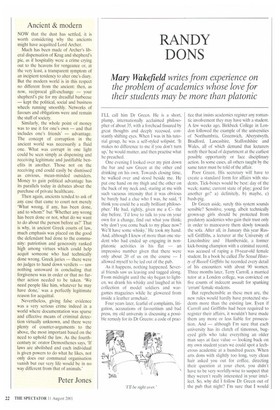Ancient & modern
NOW that the dust has settled, it is worth considering why the ancients might have acquitted Lord Archer.
Much has been made of Archer's liberal dispensation of Krug and shepherd's pie, as if hospitality were a crime dying out to the heavens for vengeance or, at the very least, a transparent symptom of an incipient tendency to alter one's diary. But the modern world is in this respect no different from the ancient: then, as now, reciprocal gift-exchange — your shepherd's pie for my dreadful barbecue — kept the political, social and business wheels running smoothly. Networks of favours and obligations were and remain the stuff of society.
Similarly, the whole point of money was to use it for one's own — and that includes one's friends' — advantage. The concept of corruption in the ancient world was necessarily a fluid one. What was corrupt in one light could be seen simply as dispensing and receiving legitimate and justifiable benefits in another. Those not on the receiving end could easily be dismissed as envious, mean-minded outsiders. Money to gain political advantage has its parallels today in debates about the purchase of private healthcare.
Then again, ancients tended to ask of any case that came to court not merely 'What wrong, if any, has been done, and to whom?' but 'Whether any wrong has been done or not, what do we want to do about the person before us?' That is why, in ancient Greek courts of law, much emphasis was placed on the good the defendant had done to the community: patriotism and generosity ranked high among virtues which could help acquit someone who had technically done wrong. Greek juries — there were no judges to hand down verdicts — saw nothing untoward in concluding that forgiveness was in order or that no further action needed to be taken. 'We need people like him, whatever he may have done,' was a perfectly legitimate reason for acquittal.
Nevertheless, giving false evidence was a very serious crime indeed in a world where documentation was sparse and effective means of criminal detection virtually unknown, and there were plenty of counter-arguments to the above, the most important based on the need to uphold the law. As the fourthcentury BC orator Demosthenes says, 'If laws are abolished and each individual is given powers to do what he likes, not only does our communal organisation vanish but our very life would be in no way different from that of animals.'
Peter Jones


























































 Previous page
Previous page